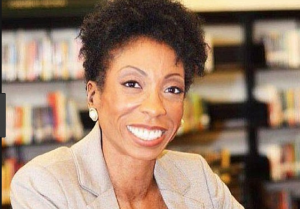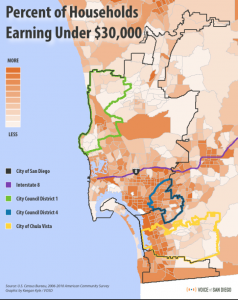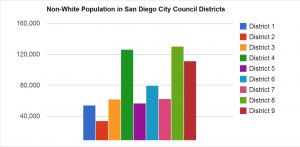“We are a collective of Black feminists who have been meeting together since 1974. During that time we have been involved in the process of defining and clarifying our politics, while at the same time doing political work within our own group and in coalition with other progressive organizations and movements. The most general statement of our politics at the present time would be that we are actively committed to struggling against racial, sexual, heterosexual, and class oppression, and see as our particular task the development of integrated analysis and practice based upon the fact that the major systems of oppression are interlocking. The synthesis of these oppressions creates the conditions of our lives. As Black women we see Black feminism as the logical political movement to combat the manifold and simultaneous oppressions that all women of color face.”– The Combahee River Collective Statement1
The civil rights and the women’s suffrage movements are two of America’s biggest historical milestones. These movements granted rights and power to African Americans and women which allowed for “social and political equality”. However, despite the “rights” granted to women and African Americans, this did not cause for total equality. The racial prejudice that ensued within these movements (specifically the women’s movement) went unnoticed to everyone except that of the oppressed group, black women. “One issue that is of major concern to us and that we have begun to publicly address is racism in the white women’s movement. As Black feminists we are made constantly and painfully aware of how little effort white women have made to understand and combat their racism, which requires among other things that they have a more than superficial comprehension of race, color, and Black history and culture. Eliminating racism in the white women’s movement is by definition work for white women to do, but we will continue to speak to and demand accountability on this issue”2. The women’s movement and civil rights movement hugely affected men and white women, leaving black women on the back burner.
Seeking a voice in public office under the condition of being a female or any race other than white meant beating the inevitable odds, and for Monica Montgomery, resilience was key in identifying as a black women in America while running for office. Before women could vote they were running for office, seeking for a voice in any government institution. And, the same year African Americans were given rights to vote and hold public office, Hiram Rhode Reynolds becomes the first black man to run and successfully become to first black holder of public office. Although these milestones meant anything plausible is achievable, Charles D Hadley examines the combination of the two groups and the idea of a “double disadvantage”. “Because blacks are at a political disadvantage, and because women are at political disadvantage, black women are doubly disadvantaged”3, however, despite this double disadvantage concept, Monica Montgomery overcame this and stands as an inspiration for black women in America.
On November 26th, 2018, Monica Montgomery was elected as a San Diego city council member. Her platform brought social and economic attention; bringing in more jobs by “ensuring city contractors have diverse hiring practices and hire locally”4, and, improve relations with police by “reviewing the use of force and racial profiling”5 in her represented district. Montgomery’s victory was not only a major success for the African American community in San Diego, but especially amongst African American women whom experience this “double disadvantage”.

This election was specifically inspiring for two reasons. Montgomery, an African American woman, had been elected over an incumbent which is extremely difficult to achieve and, Montgomery was running against another black woman, Myrtle Cole. Montgomery defeated Cole by collecting “nearly 58 percent”6 of the votes. Now, imagine two black women running for any office in 1953. This idea would be very difficult to seriously consider. In the 21st century, the United States of America has made strides in social, economic and political reforms. These changes allow for community building within certain areas; Montgomery being an excellent example. Montgomery, a black woman, has allowed for a voice within the minority community of San Diego, and more specifically within the female minority community of San Diego. Not only did San Diego district 4 elect a black woman previous to Montgomery, but re-elected a black woman into office prior, “If women are scarce in government, minority women are even scarcer”7.
Systematic racism or Institutional racism is a very conniving but real concept in America. Systematic racism is “racial bigotry by the existence of institutional systemic policies, practices and economic and political structures which place minority racial and ethnic groups at a disadvantage in relation to an institution’s racial or ethnic majority”8. Systematic racism is prevalent in schools, criminal conviction, neighborhoods, etc. Montgomery has utilized components within her campaign to bring attention and suggest a solution to some of these examples of systematic racism within San Diego district 4. Montgomery promised police accountability within her platform. This will prevent police officers from criminal conviction using racial profiling, a major concern in modern day America. Montgomery also has campaigned for a number of fundraisers, all proceeds to be directly funded to San Diego district 4, the most racially diverse district in San Diego, “While District 4 and District 8, which includes San Ysidro, Otay Mesa and Barrio Logan, are the two most racially diverse districts”9. It is important to take into consideration that the most racially diverse district in San Diego (district 4) is also one of the poorest, “Poverty extends across San Diego’s southeastern neighborhoods, but to a lesser degree in southern sections like Paradise Hills and Bay Terraces”10.


In a country that has an extensive racist and prejudice background, I find it interesting when politicians of any minority run for office to represent a country that is still experiencing racial profiling and prejudice in contemporary times. Does this bring conflict into their community? As a minority, it is very important for a politician from my background to use their platform not only to create political reforms, but to help us create a life without racial profiling and with equal opportunity. Montgomery has taken advantage of her power to bring a solution to intraracial and interracial issues by reducing racial profiling by police in San Diego and allowing for more job opportunities amongst minorities in San Diego. Montgomery has taken account for representing the most racially diverse district in San Diego and worked to make effective reforms, something not all non-white politicians take into consideration.
Montgomery’s success story has brought the prevalent concept of intersectionality between racial and sexist oppression amongst black women to light in San Diego. This concept of the “double disadvantage” has been realized among black women for decades and includes many familiar names whom also stood as black women activists, Ida B Wells, Harriet Tubman and Sojourner Truth. Although Montgomery has not clearly stated that she is an activist, she has contributed to the movement toward racial and sexist equality within black women by beating inevitable odds, and once again, proving that anything plausible is in fact attainable.

